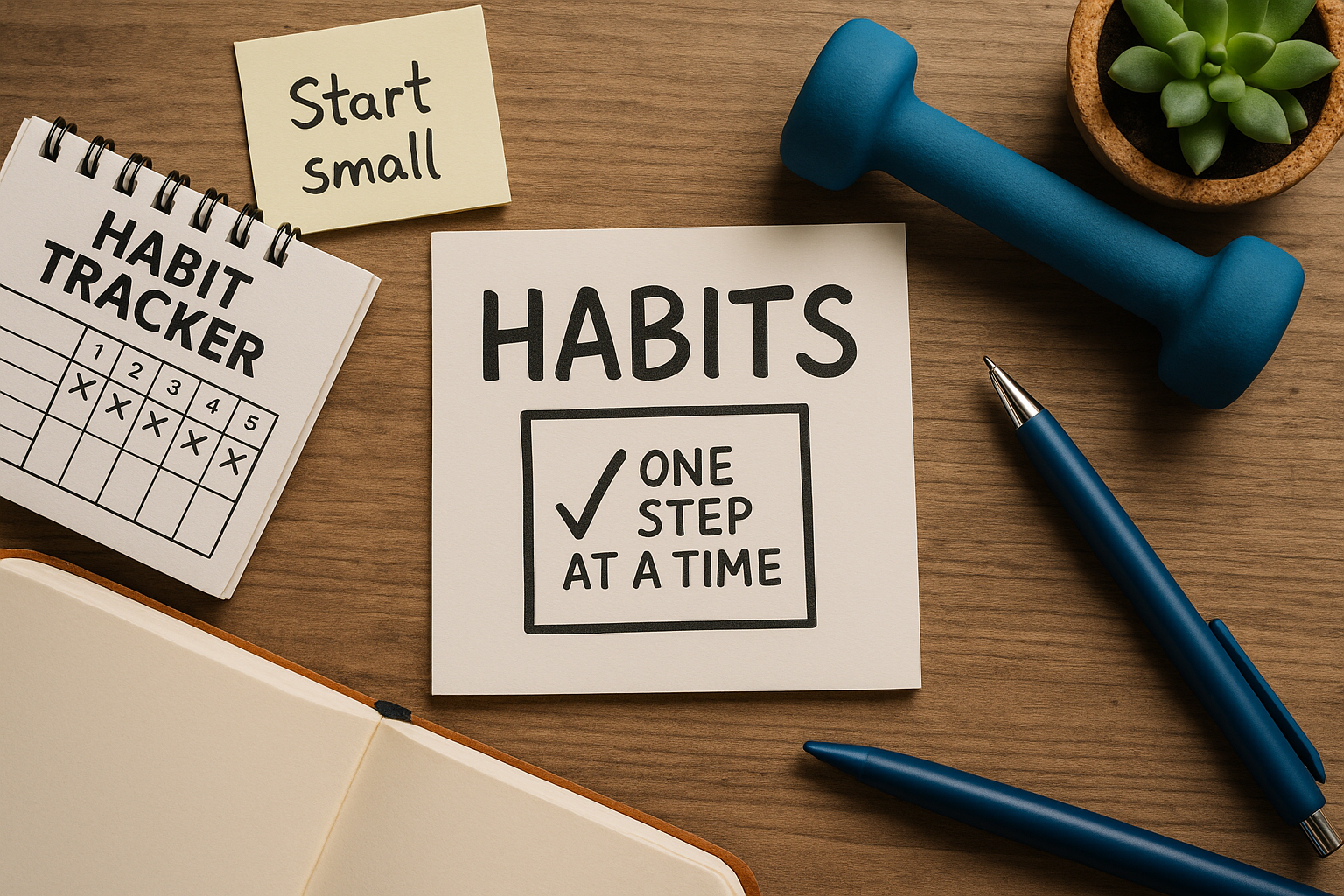Everyone has goals — but few people consistently take the daily actions required to reach them. Why? Because motivation fades, and willpower is unreliable. What really drives long-term success are habits — the small, repeated actions that compound over time.
But building new habits can feel hard. The good news is that with the right strategy, it becomes not only doable but sustainable.
In this article, you’ll learn a step-by-step system to build habits that stick — even when life gets busy or motivation runs low.
Why Habits Matter More Than Motivation
Motivation is great for getting started. But habits are what carry you through. They reduce decision fatigue, create automatic behavior, compound into major change over time, and shape your identity and lifestyle. If you build the right habits, success becomes inevitable.
1. Start Tiny (Really Tiny)
One of the biggest mistakes people make is starting too big. The brain resists drastic change. Instead, shrink the habit to something so small you can’t fail.
Examples:
- Want to exercise? Start with 2 minutes of stretching.
- Want to journal? Write one sentence.
- Want to meditate? Breathe deeply for 30 seconds.
Small wins build momentum and remove resistance.
2. Anchor Your Habit to an Existing Routine
Don’t rely on remembering. Tie your new habit to something you already do.
Formula: After [current habit], I will [new habit]
Examples:
- After I brush my teeth, I’ll write one thing I’m grateful for.
- After I make coffee, I’ll read one page of a book.
- After I shut my laptop at 5 PM, I’ll do 10 push-ups.
This builds a natural trigger — which makes the habit automatic.
3. Make It Easy
We tend to do what’s convenient and avoid what’s not. Lower the friction for your new habit.
Tips:
- Lay out workout clothes the night before.
- Keep your journal on your pillow.
- Use apps or timers to guide routines.
- Prep healthy snacks in advance.
Make the good habit the path of least resistance.
4. Use Visual Cues and Reminders
Out of sight = out of mind. Visual cues help prompt your habit.
Ideas:
- Sticky notes
- Phone alarms or calendar reminders
- A visible checklist
- A habit tracker on your fridge or desk
Visual reinforcement makes the habit feel real and rewarding.
5. Track Progress (But Keep It Simple)
Seeing your habit streak grow is incredibly motivating. Track progress in a way that works for you.
Methods:
- Cross off days on a calendar
- Use a habit tracker app
- Put marbles in a jar
- Write it in your journal
Tracking builds awareness, accountability, and momentum.
6. Celebrate Immediately
The brain loves rewards. Reinforce the habit by celebrating right after you complete it — even if it’s small.
Try:
- Saying “yes!” or fist-pumping
- Smiling or standing tall
- Writing a positive word or emoji on your tracker
Celebration creates positive emotional associations with the habit.
7. Anticipate Roadblocks
Life happens. Instead of letting setbacks throw you off, plan for them.
Ask yourself:
- What might get in the way of this habit?
- What’s my plan if that happens?
Examples:
- If I forget to journal in the morning, I’ll do it before bed.
- If I miss a workout, I’ll go for a walk instead.
Flexibility keeps you consistent.
8. Don’t Miss Twice
Missing a habit once is normal. Missing it twice starts a new habit — the habit of skipping.
Rule: If you miss a day, bounce back the next day. No guilt. No drama. Just reset.
Consistency is more important than perfection.
9. Focus on Identity, Not Just Outcome
Don’t just aim to lose weight, write a book, or save money. Focus on becoming the type of person who does those things.
Examples:
- “I’m a healthy person who moves daily.”
- “I’m a writer who writes every morning.”
- “I’m someone who takes care of my finances.”
When your actions align with your identity, habits become second nature.
10. Review and Adjust Monthly
Habits are not “set it and forget it.” Review what’s working and tweak what’s not.
Ask yourself:
- What habit felt easy to maintain?
- What habit did I keep skipping — and why?
- What can I simplify or adjust?
This keeps your habits alive and evolving with you.
You Don’t Need to Be Perfect — Just Persistent
Building habits isn’t about willpower or discipline. It’s about strategy. When you shrink the habit, tie it to a cue, make it easy, and celebrate your progress, you create a system that supports you.
Start with one habit. Make it tiny. Track it. Stick with it. And before you know it, you’ll look back and realize you’ve changed your life — one small action at a time.
Because success isn’t about doing more — it’s about doing what matters, consistently.
